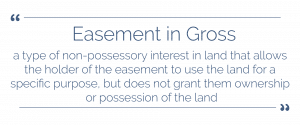Easement Appurtenant & Easement in Gross – Explained [2024]

In general, there are two different types of easements that can be created by express grant – either an appurtenant easement or an easement in gross.
Easement Appurtenant vs Easement in Gross
An easement that runs with the land lasts forever unless the two simultaneous property owners agree, in writing, to cancel it. Of course, there are other ways to extinguish an easement but that are not covered in this post.
In contrast, an easement in gross is a personal easement that necessarily does not run with the land. That means the owner of the easement owns the personal right to use the easement but that right does not pass to future owners. An example of an appurtenant easement would be an easement for having the rights of pasture, fishing and taking game.
Lets dive in and understand both types of easements in detail.
What is an Easement Appurtenant?

Appurtenant Easement Definition and Characteristics:
- An easement appurtenant is a right attached to a piece of land (the dominant estate) that allows its owner to use the neighboring land (the servient estate) for a specific purpose.
- It is a real property interest and is tied to the land, not the individual owner. This means it persists through changes in ownership.
ALSO READ Joe Montana Lawsuit Versus San Francisco for Property Damages
The easement is “appurtenant” to the dominant estate, meaning that it is permanently attached to the property and passes to any subsequent owners of the dominant estate.
In layman’s terms, this means that one property is meant to be the beneficiary of the easement and the other property owner is meant to be burdened by the easement.
The key thing to remember about easements appurtenant is that they are rights to use someone else’s property that are permanently attached to the property.
Unlike an easement in gross, which is a personal right that can be transferred or sold independently of the land it grants access to, an easement appurtenant is a property right that is attached to the land and is transferred along with the property when it is sold.
Further Reading
- FindLaw’s Easement Overview.
- Justipedia’s Definition of Appurtenant Easement.
Easement Appurtenant Examples and Scenarios:
- Access to Landlocked Property: If a property is landlocked and has no direct access to a public road, an easement appurtenant may be granted over a neighboring property to provide access.
- Shared Natural Resources: For properties that share a water source like a well or a pond, an easement appurtenant can allow one property owner to lay pipes across a neighbor’s land to access the water.
- Overhanging Structures: In urban settings, a building owner might need an easement appurtenant to allow parts of their structure, like a balcony or awning, to overhang into a neighbor’s airspace.
Easement Appurtenant Legal Implications and Challenges:
- Creation and Documentation: Easement appurtenants are typically created through written agreements and should be recorded with local land records to ensure enforceability against future owners.
- Disputes: Disputes often arise regarding the extent of use or maintenance responsibilities. For instance, if an easement allows for vehicle access, disagreements may occur over the types of vehicles permitted.
- Termination: These easements can be terminated by mutual agreement, abandonment, or if the dominant and servient estates become owned by the same party (merger).
Easement Appurtenant Maintenance and Responsibilities:
- The maintenance responsibility typically lies with the owner of the dominant estate. However, specific terms should be outlined in the easement agreement to avoid disputes.
- In some cases, both parties might share maintenance responsibilities, especially if the easement benefits both properties.
Impact on Property Value:
- An easement appurtenant can both increase and decrease property values. For the dominant estate, having access rights can enhance its value, especially if it resolves an issue like landlocked property.
- Conversely, for the servient estate, the presence of an easement can be seen as a limitation, potentially reducing its market value.
ALSO READ An Easement and License Case Example
Further Reading
- Analyzing Easement Laws and Cases in the States
- Easements in Texas: This document from Texas A&M University discusses appurtenant easements in the context of Texas law, detailing the requirements for different estates (dominant and servient) for their existence. This can be particularly useful for understanding easements in a specific state context
- Easement Basics
- Law of Easements This document is a review of the law of easements.
What is an Easement in Gross?

An easement in gross is a right to use another person’s land for a specific purpose, but unlike an easement appurtenant, it is not tied to the ownership of adjacent land.
This type of easement is personal to the holder and is often used for utility, environmental, or recreational purposes.
This type of easement is typically granted to utility companies, allowing them to access and maintain equipment on the land, or to individuals who need access to a specific piece of land for a specific reason.
Unlike other types of easements, an easement in gross is not attached to a specific piece of property and can be transferred or sold independently of the land it grants access to.
Easement in Gross Examples and Scenarios:
- Utility Easements: The most common form of easement in gross is for utilities. Utility companies may have an easement in gross to install and maintain infrastructure like power lines, water pipes, or sewer systems on private property.
- Conservation Easements: These are used to preserve open space, restrict development, or protect natural resources. A land trust might hold an easement in gross to enforce conservation goals on a property.
- Personal Enjoyment: An individual might be granted an easement in gross for personal use, such as fishing in a private pond or accessing a private road to reach a public park.
Easement in Gross Legal Implications and Challenges:
- Transferability: Unlike easement appurtenant, easements in gross may or may not be transferable, depending on the terms of the agreement and local laws.
- Duration: These easements can be established for a specific period or indefinitely. Some may even be revocable depending on the agreement between the parties.
- Disputes: Disputes in easements in gross often arise around overuse or misuse of the easement, or interference by the landowner with the easement holder’s rights.
Easement in Gross Maintenance and Responsibilities:
- Typically, the holder of the easement in gross is responsible for maintenance related to their use of the easement. For instance, a utility company must maintain its power lines.
- The agreement should clearly outline the responsibilities to prevent disputes.
Easement in Gross Impact on Property Value:
- Easements in gross, especially those granted to utility companies, may have little to no impact on the property value. However, large easements or those that significantly restrict the use of the property can reduce its value.
- For the easement holder, such as a utility company, the easement in gross provides essential access, which is a valuable asset.
ALSO READ How to Protect Your Property From Prescriptive Easement?
Unique Considerations:
- Negotiation and Compensation: Property owners might negotiate compensation for granting an easement in gross, especially in cases where the easement could impact the use or value of their property.
- Regulatory Compliance: Easements in gross for utilities or environmental conservation often involve compliance with local, state, or federal regulations.
Easement in Property Law
The law provides that if an easement does not state the specific the type of easement that it is, then it is presumed to be appurtenant. Schmidt v. Bank of America 223 Cal.App.4th 1489,1499.
Over that past decade, our easement dispute attorneys have done extensive easement work that has allowed us to gain insight into the various types of easements that can be created. We have also extensively litigated competing easements claims throughout Los Angeles, in the Hollywood Hills, Brentwood, Palos Verdes and throughout Southern California.
Schorr Law is a top rated real estate firm in Los Angeles. To schedule a consultation regarding your easement matter, contact us at (310) 954-1877, or you can email [email protected]. You can also directly message us here.




